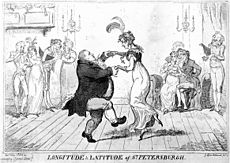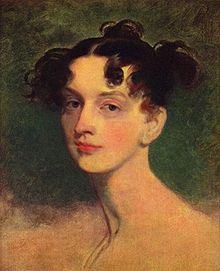- Dorothea Lieven
-
 HSH Princess von Lieven line engraving by William Bromley, after a drawing by Sir Thomas Lawrence, published 1825; original in the Hermitage Museum.
HSH Princess von Lieven line engraving by William Bromley, after a drawing by Sir Thomas Lawrence, published 1825; original in the Hermitage Museum.
HSH Princess Dorothea von Lieven (Russian: Дарья Христофоровна Ливен, Daria Khristoforovna Liven), née Benckendorff (17 December 1785 - 27 January 1857), a Baltic German noblewoman and wife of Prince Khristofor Andreyevich Lieven, Russian ambassador to London, 1812 to 1834, was a political force in her own right.
Contents
Life
Dorothea was born into Russia’s distinctive Baltic nobility in Riga, now Latvia. Her father, General Christopher von Benckendorff, served as the military governor of Livonia; her mother, Anna Juliane née Schilling von Cannstatt, held a high position at the Romanov Court as senior lady-in-waiting and best friend of Empress Maria Fyodorovna.
Educated at St. Petersburg’s exclusive Smolny Convent Institute, von Lieven was assigned as a maid of honour to Maria Fyodorovna. In 1800, at age fourteen, some months after finishing her studies, von Lieven married General Count (later Prince) Christopher Lieven. In 1810 he was appointed minister to Berlin. When Tsar Alexander I appointed Count Lieven ambassador to Great Britain in 1812, Dorothea von Lieven used her intelligence, charisma, and social skills to make herself a leader of London’s politically-infused society, thereby contributing materially to the success of her husband’s embassy.
In London, Princess Lieven cultivated friendships with the foremost statesmen of her day. As well, she and Austrian Chancellor Prince Klemens Lothar Wenzel von Metternich had a notorious liaison. She was also reputed to have had an affair with Lord Palmerston, although there is no firm proof. She was a close friend of Lord Castlereagh, and was one of th first people to voice concerns about his increasingly strange behaviour in the weeks leading up to his suicide.
In England's vibrant political environment, the Princess discovered in herself a flair for politics. She also became a leader of society; invitations to her house were the most sought after and she was the first foreigner to be elected a patroness of Almack's, London's most exclusive social club, where von Lieven introduced the waltz to England. Despite her apparently frivolous nature she had a deep religious faith, and far in advance of her time seems to have disapproved of the death penalty.
Dorothea von Lieven's position as the Russian ambassadress, her friendships, and her political acumen established her as a political force.
In 1825 Tsar Alexander I entrusted Dorothea with a secret overture to the British government. “It is a pity Countess Lieven wears skirts”, the Tsar wrote to his foreign minister Count Nesselrode. “She would have made an excellent diplomat.”
The Tsar’s mission marked Dorothea Lieven’s debut as a diplomat in her own right. She at least equaled her husband in importance. During Prince Lieven’s ambassadorship in England, (1812–1834) the Princess played a key role in the birth of modern Greece, and made a notable contribution to the creation of today’s Belgium. The appointment of Lord Palmerston as Foreign Secretary in 1830 is generally agreed to have been partly due to his friendship with Dorothea who lobbied Lord Grey on his behalf; however her belief that Palmerston would be reliably pro-Russian turned out to be a mistake.
Tsar Nicholas I recalled Prince Lieven (1834) to become Governor to the Tsarevitch; despite her residence in London, the Princess had already (1829) been appointed senior lady-in-waiting to Empress Alexandra. After more than 20 years in England von Lieven was horrified at having to leave her comfortable life and friends there, and she never forgave Palmerston, whose intransigence over what should have been a minor diplomatic stand-off was partly responsible. Soon after the Lievens returned to Russia their two youngest sons died suddenly. This tragedy and her declining health caused the Princess to leave her native land and settle in Paris.
In a city where salons served a unique social and political purpose, Princess Lieven’s salon, known as “the listening/observation post of Europe”, empowered her to be an independent stateswoman. In 1837 she and François Guizot entered into a close personal partnership that lasted until the Princess's death.
During the Crimean War (1854–1856) Princess Lieven acted as an informal and trusted conduit between the belligerents.
Dorothea Lieven died peacefully at her home, 2 rue Saint-Florentin, Paris. She was buried, according to her wish, at the Lieven family estate, Mežotne (near Jelgava) next to her two young sons who had died in St. Petersburg.
Legacy
Princess Lieven “succeeded in inspiring a confidence” with prominent men “until now unknown in the annals of England”, wrote Russian foreign minister Count Nesselrode. Her friendships with George IV, Prince Metternich, the Duke of Wellington, George Canning, Count Nesselrode, Lord Grey, and François Guizot gave Dorothea Lieven the opportunity to exercise authority in the diplomatic councils of Great Britain, France, and Russia. She was a political force, a position reached by no other contemporary female.
The Princess participated, either directly or indirectly, in every major diplomatic event between 1812-1857. She knew “everyone in the Courts and cabinets for thirty or forty years”; she “knew all the secret annals of diplomacy”, wrote a French diplomat. Palmerston seems to have resented her interference, writing " a busy woman must do harm because she can do no good."
Hence, Princess Lieven’s politically-focused correspondence with luminaries across Europe is primary source material for students of the period. Parts of the Princess’s diary, her correspondence with Lords Aberdeen and Grey, François Guizot, Prince Metternich, and her letters from London to her brother Count Alexander von Benckendorff, have been published. There is a vast trove of unpublished material in the British Library, and a scattering of unpublished correspondence in several Continental archives.
“She is a stateswoman”, said the Austrian ambassador to France, “and a great lady in all the vicissitudes of life.”
See also
- Christopher Lieven
- Dominic Lieven
- Elena Lieven
- Anatol Lieven
External links
- The noble family of Lieven
- Alexander von Benckendorff
- Konstantin von Benkendorff
- "Dorothea Lieven: A Russian Princess in London and Paris, 1785-1857" (McFarland, 2007) ISBN 0-7864-2651-9. By Judith Lissauer Cromwell
- Lieven, Daria Khristoforovna. Letters of Dorothea, Princess Lieven, during her Residence in London, 1812-1834. 2001: Adamant Media Corporation. ISBN 1-4212-1683-3
- Hermitage Museum, St Petersburg (location of original portrait drawing by Sir Thomas Lawrence)
- Tate Gallery, London (direct link to original portrait painting by Sir Thomas Lawrence)
- (French) Brief biography
- review
- Princess Lieven's page on Wellington's site
- (German) Baltic nobility genealogy handbook Katharina Alexandra Dorothea von Benckendorff
- Archival material relating to Dorothea Lieven listed at the UK National Register of Archives
- This article includes content derived from the Russian Biographical Dictionary, 1896–1918.
Categories:- 1785 births
- 1857 deaths
- Russian nobility
- Baltic-German people
- People from Riga
- People from Livonia
- Countesses
- Women of the Regency era
- Russian ladies-in-waiting
- 19th-century Latvian people
Wikimedia Foundation. 2010.


